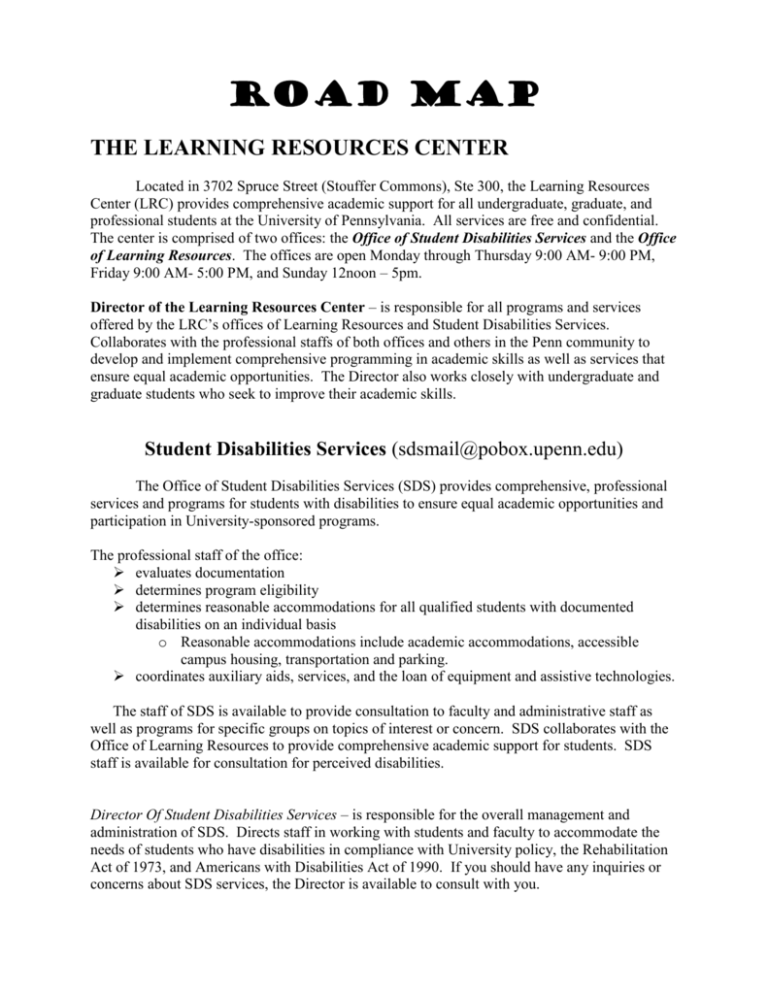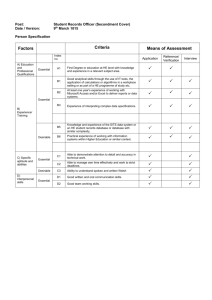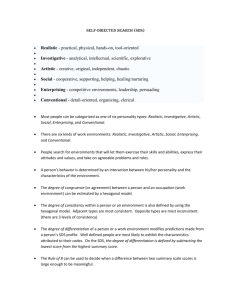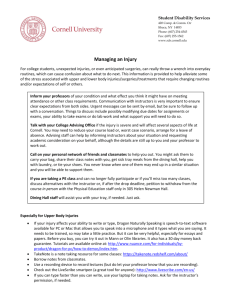SDS Procedures: - University of Pennsylvania
advertisement

Road Map THE LEARNING RESOURCES CENTER Located in 3702 Spruce Street (Stouffer Commons), Ste 300, the Learning Resources Center (LRC) provides comprehensive academic support for all undergraduate, graduate, and professional students at the University of Pennsylvania. All services are free and confidential. The center is comprised of two offices: the Office of Student Disabilities Services and the Office of Learning Resources. The offices are open Monday through Thursday 9:00 AM- 9:00 PM, Friday 9:00 AM- 5:00 PM, and Sunday 12noon – 5pm. Director of the Learning Resources Center – is responsible for all programs and services offered by the LRC’s offices of Learning Resources and Student Disabilities Services. Collaborates with the professional staffs of both offices and others in the Penn community to develop and implement comprehensive programming in academic skills as well as services that ensure equal academic opportunities. The Director also works closely with undergraduate and graduate students who seek to improve their academic skills. Student Disabilities Services (sdsmail@pobox.upenn.edu) The Office of Student Disabilities Services (SDS) provides comprehensive, professional services and programs for students with disabilities to ensure equal academic opportunities and participation in University-sponsored programs. The professional staff of the office: evaluates documentation determines program eligibility determines reasonable accommodations for all qualified students with documented disabilities on an individual basis o Reasonable accommodations include academic accommodations, accessible campus housing, transportation and parking. coordinates auxiliary aids, services, and the loan of equipment and assistive technologies. The staff of SDS is available to provide consultation to faculty and administrative staff as well as programs for specific groups on topics of interest or concern. SDS collaborates with the Office of Learning Resources to provide comprehensive academic support for students. SDS staff is available for consultation for perceived disabilities. Director Of Student Disabilities Services – is responsible for the overall management and administration of SDS. Directs staff in working with students and faculty to accommodate the needs of students who have disabilities in compliance with University policy, the Rehabilitation Act of 1973, and Americans with Disabilities Act of 1990. If you should have any inquiries or concerns about SDS services, the Director is available to consult with you. Associate Director – meets with students who have physical and sensory disabilities and/or chronic illnesses and conditions to determine the provision of reasonable accommodation and auxiliary services based on a documented need. The Associate Director is the contact person for coordinating housing, transportation, parking, dining, building/classroom access, campus orientation, Student Health and/or related accommodation concerns. Learning Disabilities Coordinator – reviews student documentation. He works in collaboration with students who are identified with a learning or psychological disability or a processing cognitive deficit (such as ADD) to determine fair and reasonable accommodations that address students’ needs. Administrative Coordinator – is the primary contact in SDS regarding implementation of accommodations and services. Coordinates students’ scheduled accommodations as well as answers questions about services, policies, and procedures. The Administrative Coordinator is the office’s “webmaster” and the principle respondent to SDSMAIL@POBOX.UPENN.EDU Office of Learning Resources (lrcmail@pobox.upenn.edu) The Office of Learning Resources provides professional instruction in university relevant skills such as academic reading, writing, and study strategies. Topics often addressed during instruction include time management, reading efficiently, taking lecture and text notes, exam preparation, test-taking skills, and writing for a variety of purposes. Individual instruction is available by appointment, Monday through Friday from 9:00 AM to 5:00 PM. (1 hour appointments) Walk-in hours are available Monday through Friday from noon to 3:00 PM during the academic year. (1/2 hour appointments) Printed information is available in the form of self-help pamphlets, handouts, and calendar tools for independent use. Learning Coordinator for Students with Disabilities – addresses various areas of academics with students in the context of students’ own course work. With students, examines ways in which their LD impacts their learning in specific courses and discusses approaches that would be most effective and beneficial to meet the expectations of their courses. Assesses with students how they learn best and ways in which they can capitalize on their learning strengths. Works closely with SDS as well as serves as a resource for faculty and staff on issues of learning. Now that I know who everybody is . . . what do I do next? 1. Make an appointment with the appropriate SDS member. If you have never met with SDS before, call to make an appointment The Associate Director works with students who have physical, mobility, and sensory disabilities. The Director Of Student Disabilities Services and The Learning Disabilities Coordinator with students who have learning disabilities, ADHD, and psychological disabilities. If you have not already sent your documentation to SDS, bring it with you to this initial meeting. At this meeting, you will discuss the accommodations that you are requesting and review the ways of accessing the accommodations. Exam accommodations At this meeting, you will discuss the implementation of the exam accommodation arrangements (Exam accommodations can be provided directly by your professor or by the SDS staff). Other accommodations At this meeting, you will discuss with SDS the coordination of auxiliary services such as: note takers; readers; library assistants; use of assistive listening devices; Oral/American Sign Language Interpreters or Computer Assisted Real Time (CART) reporters; reproduction of reading materials, exams, charts and graphs in large print; alternate test formats; and use of equipment to take examinations There is a variety of assistive technology available at SDS as well as the Van Pelt Library (898-2316) or the Undergraduate Study Center (898-7561). If alternate formats for print material are necessary, it is important that you speak with your professors before or at the beginning of each semester to discuss reading lists, textbooks and syllabi. Also, alert SDS if your courses or exams are located in an inaccessible building (so that it may be moved to a location that is accessible). 2. Fill out a Course Roster sheet (every semester!) Each semester, regardless of how long you’ve been using SDS services, you must come to SDS to fill out and sign a Course Roster sheet. This Course Roster provides SDS with the contact information of your current courses and also serves as the release form which allows SDS to contact your professors regarding accommodations. SDS requires a signed and dated Course Roster before contacting a professor regarding your accommodation. SDS requires one week from the day you turn in your roster to mail letters to your professors. 3. Talk to your professors. It is imperative that you speak with your professors at the beginning of each semester and well in advance of the first exam. Schedule an appointment to meet with your professors or visit them during their office hours. Discuss with them your accommodations and how they will be implemented. For example: Who will arrange the proctor for the exam (the professor or SDS)? If the exam is in an alternate location, where will the exam be administered and who will proctor it? 4. Review each course syllabus thoroughly. Make sure you read through each course syllabus. Write down on a calendar or planner the listed dates of all exams and quizzes. This will allow you to give ample notice to the professors and SDS regarding exam accommodations. Also, reading through the syllabi gives you an overview of the course and allows you to examine the expectations and assignments of the course. 5. Give exam notification. It is your responsibility to inform your professor and SDS when you need exam accommodations. As soon as you know the date of an exam—most will be listed in your syllabi—notify SDS if you are going to use the Office to implement the exam accommodation. SDS needs at least 14 days advance notice in order to process exam accommodation requests. Exam accommodations requested with less than 14 day notice will not be guaranteed. How to request exam accommodations: If you have talked to your professor and he or she requests that SDS provide the proctor and exam location, you need to let SDS know at least 14 days before the exam. There are several ways to request exam accommodations: 1) Go to the SDS website and fill out an “Exam request” form on-line: http://www.vpul.upenn.edu/lrc/sds/exam_accommodation.html 2) Phone 573-9235 and talk with the Administrative Coordinator. 3) Stop by the SDS office and fill out an “Exam Request” form. Necessary information to include: Your name Course name and number (e.g., Econ 002, section 003) Professor’s name, e-mail, and phone number Scheduled exam date, time, location Accommodations requested: (e.g., extended time, alternate location, proctor, scribe, laptop use, other.) Location: SDS, scheduled exam site, or alternate location near scheduled exam site Due to extended time, are their any course conflicts SDS needs to know? Information must be complete and accurate. Tips for Success Make an appointment with a learning instructor. A learning instructor can help you in the various areas of academics. With a learning instructor, you can get a game plan for each of your courses build strategies in academic reading find writing processes that work for you garner study and exam taking strategies find a time management system that works for you. get help in setting goals for your courses find approaches for meeting those goals institute structure and organization into your schedule. Call 573-9235 to make an appointment. Or, come to walk-in hours, 12-3 Monday-Friday during the academic year. Check out the website at: http://www.vpul.upenn.edu/lrc/lr/index.html Maintain on-going contact with professors and TAs Get in the habit of attending professor and TA office hours. You can use this time to ask specific questions, elaborate on topics discussed in class, and ask for clarification. Use other support services In addition to the services of the Learning Resources Center, there are a variety of other academic support services available to all students of the university. Use them! Some are: Department of Academic Support Programs http://www.vpul.upenn.edu/dasp/dasp_home.html Counseling and Psychological Services http://www.vpul.upenn.edu/caps/ The Writing Center http://writing.upenn.edu/critical/help_wc.html The Library Reference Desks can assist with library searches and navigating the library. http://www.library.upenn.edu/ Career Services http://www.vpul.upenn.edu/careerservices/ Maintain on-going contact with your advisor Meet with your academic advisor to plan out your semesters and to map out your course of action while you are at Penn. Discuss with your advisor what majors and courses fit with your career aspirations and with the way you learn. Get to know your school liaisons Each school has a liaison to the SDS office. Check the SDS website for names and contact information. Plan ahead Try to obtain copies of the syllabi for your next semester’s classes. This will allow you to request books on tape (if you use this accommodation) as well as give you a head start on some of the reading. Check out studying abroad policies and procedures Different educational systems may be more challenging to your learning style and learning needs—or, in some cases, more conducive to your learning. Be aware that you may not receive accommodations or auxiliary services when your documentation is reviewed by another country’s standards. Student Disabilities Services A Quick Look 1. Make an appointment with the appropriate SDS staff member. Call: 215-573-9235 Physical, mobility & sensory – Associate Director Learning, ADHD, psychological – Director and/or Learning Disabilities Coordinator Immediately notify SDS of any course changes 2. Fill out a course roster sheet – EVERY SEMESTER! 3. Talk to your professors. 4. Review each course syllabus thoroughly. 5. Give exam notification 1) 2) 3) 4) Go to the SDS website and fill out an “Exam request” form on-line: http://www.vpul.upenn.edu/lrc/sds/exam_a ccommodation.html E-mail sdsmail@pobox.upenn.edu Phone 573-9235 and talk with the Administrative Coordinator Stop by the SDS office and fill out an “Exam Request” form. You must request exam accommodations 14 DAYS in advance



